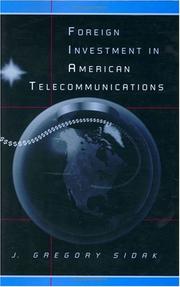| Listing 1 - 9 of 9 |
Sort by
|

ISBN: 0226756262 9786611430535 1281430536 0226756289 9780226756288 9780226756264 Year: 1997 Publisher: Chicago : University of Chicago Press,
Abstract | Keywords | Export | Availability | Bookmark
 Loading...
Loading...Choose an application
- Reference Manager
- EndNote
- RefWorks (Direct export to RefWorks)
Restrictions on foreign investment in U.S. telecommunications firms have harmed the interests of American consumers and investors, argues J. Gregory Sidak in this convincing study. Sidak shows why these restrictions, originally intended to protect America from the perils of wireless telegraphy by foreign agents, should be repealed. Basing his analysis on legislative history, statutory and constitutional interpretation, and finance and trade theory, Sidak shows that these restrictions no longer serve their national security purpose (if they ever did). Instead they deny American consumers lower prices and more robust innovation, hamper access of American investors to foreign telecommunications markets, and unconstitutionally impinge on freedom of speech. Sidak's study encompasses the Telecommunications Act of 1996, recent global mergers such as British Telecom-MCI, and the 1997 World Trade Organization agreement to liberalize trade in telecommunications services.
Telecommunication --- Investments, Foreign --- Law and legislation --- E-books --- foreign investment, telecommunications, business, legislation, regulation, government, capitalism, wireless telegraphy, national security, finance, ownership, control, policy, free speech, wto, nonfiction, consumers, prices, innovation, british telecom-mci, economics, world trade organization, constitution, law, legal, politics, corporate, commerce.

ISBN: 0521591597 0521658713 0511572220 9780521591591 Year: 1997 Publisher: Cambridge : Cambridge University Press,
Abstract | Keywords | Export | Availability | Bookmark
 Loading...
Loading...Choose an application
- Reference Manager
- EndNote
- RefWorks (Direct export to RefWorks)
This 1998 book addresses deregulatory policies that threaten to reduce or destroy the value of private property in network industries without any accompanying payment of just compensation, policies that are termed 'deregulatory takings'. The authors further consider the problem of renegotiation of the regulatory contract, which changes the terms and conditions of operation of utility companies. They argue that constitutional protections of private property from takings, as well as efficient remedies for contractual breach, provide the proper foundation for the competitive transformation of the network industries. The benefits of competition do not stem from government regulations that redistribute income from utility investors to customers, nor do such benefits stem from regulatory policies for network access that promote free riding on incumbent facilities by entrants. Such actions represent a new version of increased regulation, not deregulation.
Telecommunication --- Electric utilities --- Public utilities --- Right of property --- Breach of contract --- Télécommunications --- Services publics d'électricité --- Services publics --- Droit de propriété --- Inexécution --- Deregulation --- Law and legislation --- Déréglementation --- Droit --- Télécommunications --- Services publics d'électricité --- Droit de propriété --- Inexécution --- Déréglementation --- Business, Economy and Management --- Economics --- Industrial economics --- Public economics --- Telecommunication services --- United States --- Telecommunication - Deregulation - United States --- Telecommunication - Law and legislation - United States --- Electric utilities - Deregulation - United States --- Electric utilities - Law and legislation - United States --- Public utilities - Deregulation - United States --- Public utilities - Law and legislation - United States --- Right of property - United States --- Breach of contract - United States --- Economic liberties (U.S. Constitution) --- Municipal utilities --- Public-service corporations (Public utilities) --- Utilities, Public --- Utility companies --- Municipal franchises --- United States of America
Periodical
Year: 2016 Publisher: [Washington, DC] : Criterion Economics LLC,
Abstract | Keywords | Export | Availability | Bookmark
 Loading...
Loading...Choose an application
- Reference Manager
- EndNote
- RefWorks (Direct export to RefWorks)
"The Criterion journal on innovation publishes articles on the law and economics of innovation. Publication is exclusively online."
Technological innovations --- Technology and law --- Business enterprises --- Patent laws and legislation --- Patent laws and legislation. --- Technology and law. --- Law and legislation --- Economic aspects --- Technological innovations. --- Economic aspects. --- Law and legislation.
Periodical
Year: 2016 Publisher: [Washington, DC] : Criterion Economics LLC,
Abstract | Keywords | Export | Availability | Bookmark
 Loading...
Loading...Choose an application
- Reference Manager
- EndNote
- RefWorks (Direct export to RefWorks)
"The Criterion journal on innovation publishes articles on the law and economics of innovation. Publication is exclusively online."
Technological innovations --- Technology and law --- Business enterprises --- Patent laws and legislation --- Patent laws and legislation. --- Technology and law. --- Law and legislation --- Economic aspects --- Technological innovations. --- Economic aspects. --- Law and legislation.
Periodical
Year: 2016 Publisher: [Washington, DC] : Criterion Economics LLC,
Abstract | Keywords | Export | Availability | Bookmark
 Loading...
Loading...Choose an application
- Reference Manager
- EndNote
- RefWorks (Direct export to RefWorks)
"The Criterion journal on innovation publishes articles on the law and economics of innovation. Publication is exclusively online."
Technological innovations --- Technology and law --- Business enterprises --- Patent laws and legislation --- Law and legislation --- Economic aspects
Book
Abstract | Keywords | Export | Availability | Bookmark
 Loading...
Loading...Choose an application
- Reference Manager
- EndNote
- RefWorks (Direct export to RefWorks)
Book
ISBN: 9780387253879 Year: 2005 Publisher: Boston MA Springer US
Abstract | Keywords | Export | Availability | Bookmark
 Loading...
Loading...Choose an application
- Reference Manager
- EndNote
- RefWorks (Direct export to RefWorks)
Broadband is a key enabler of the information society, increasing productivity and competitiveness across all sectors of the economy. Unlike traditional n- rowband connections, broadband provides high speed, always-on connections to the Internet and supports innovative content and services. Direct consumer welfare gains from mass-market adoption of broadband across the EU could easily reach 50 billion euros or more per annum. This is quite apart from the more profound societal shifts that ubiquitous broadband could bring. It may allow the individual to distribute content and ideas independent of traditional media and bring together communities of interest without regard to borders. Public policy for broadband will have a big impact on whether and how quickly these bene?ts are realised. Getting policy right could bring large bene?ts for consumers, ?rms and the economy at large; getting policy wrong risks s- ?ing both the rollout of broadband and new innovative services, and thus the realisation of the EU's e-Europe vision. In this book, we focus on the residential market for broadband access in EU countries, analysing the current and prospective level of competition and dr- ing implications for public policy. A key aim is to understand better the relative importance of facilities-based and access-based provision in fostering com- tition and promoting take-up of broadband services.
Economic policy and planning (general) --- Engineering sciences. Technology --- technologiebeleid --- economische politiek --- Europese eenmaking --- Europe
Digital
ISBN: 9780387253879 Year: 2005 Publisher: Boston, MA Springer Science+Business Media, Inc
Abstract | Keywords | Export | Availability | Bookmark
 Loading...
Loading...Choose an application
- Reference Manager
- EndNote
- RefWorks (Direct export to RefWorks)
Economic policy and planning (general) --- Engineering sciences. Technology --- technologiebeleid --- economische politiek --- Europese eenmaking --- Europe
Book

ISBN: 9781474470575 Year: 2022 Publisher: Edinburgh
Abstract | Keywords | Export | Availability | Bookmark
 Loading...
Loading...Choose an application
- Reference Manager
- EndNote
- RefWorks (Direct export to RefWorks)
| Listing 1 - 9 of 9 |
Sort by
|

 Search
Search Feedback
Feedback About
About Help
Help News
News